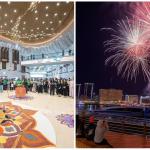In a major step toward consolidating its position as a global hub for higher education, Dubai is set to welcome three internationally renowned universities during the 2025–26 academic year. The move, officially announced by the Dubai Knowledge and Human Development Authority (KHDA), signals the emirate’s unwavering commitment to academic excellence, innovation, and global collaboration in education.
According to KHDA, the three institutions that will soon join Dubai’s thriving education landscape are:
Indian Institute of Management Ahmedabad (IIMA) – India’s top-ranking business school, globally recognised for its rigorous academics and strong industry links. IIMA is currently ranked 27th in the world for Business and Management in the QS World University Rankings by Subject.
American University of Beirut (AUB) – One of the Middle East’s oldest and most prestigious universities, AUB holds a respectable 237th spot in the QS World University Rankings and brings with it a legacy of academic leadership in liberal arts and science education.
Fakeeh College for Medical Sciences – A well-established institution from Saudi Arabia known for its excellence in healthcare education and clinical research, which will add substantial value to Dubai’s fast-growing medical and health sciences sector.
This development is part of a broader strategic vision aligned with Dubai’s Economic Agenda D33 and the Education Strategy 2033 (E33). These government-led initiatives aim to build a competitive, future-focused academic ecosystem that fosters talent, drives innovation, and contributes to doubling Dubai’s economy within the next ten years.
“Dubai’s initiative to attract the best global universities, endorsed by The Executive Council, reflects the emirate’s international stature,” said Dr Wafi Dawood, CEO of the Strategic Development Sector at KHDA. “Our visionary leaders have ensured all the resources necessary to position the emirate as a global leader and a top destination for students and prestigious international higher education institutions.”
Dr Dawood also highlighted that this initiative aligns with Dubai’s long-term goals of enhancing graduate competitiveness, boosting educational tourism tenfold by 2033, integrating Emiratis into future-focused job sectors, and establishing Dubai among the top three global economic hubs.
An Expanding Higher Education Landscape
Dubai already boasts a vibrant academic scene with 41 private international higher education providers, including 37 branch campuses of globally recognised universities. Over the years, the city has successfully attracted top-tier institutions through strategic partnerships, infrastructure support, and an inviting multicultural environment.
Several of these universities enjoy prominent global rankings, such as:
University of Manchester Dubai – parent campus ranked 35th globally
University of Birmingham Dubai – 76th globally
Curtin University Dubai – 183rd globally
University of Wollongong in Dubai – 184th globally
In addition, many institutions with campuses in Dubai have been recognised in subject-specific rankings. For instance:
London Business School, with a branch in Dubai, is ranked 7th globally in Business and Management.
ESCP Business School is placed at 54th, and Luiss University at 67th in the same category.
In Art and Design, Instituto Marangoni ranks within the 51–100 bracket, making it a leading choice for creative education.
This growing academic presence is further supported by Dubai’s Global University Attraction Project, a key pillar of the Education 33 Strategy. The initiative seeks to create an integrated education ecosystem by encouraging transnational education models, boosting research collaboration, and aligning academic output with Dubai’s long-term economic goals.
Growth in International Student Enrolment
One of the most ambitious goals under the E33 strategy is to ensure that international students account for 50% of the total student population in Dubai’s higher education sector by 2033. This target, when achieved, is expected to contribute AED 5.6 billion to the sector’s GDP annually.
Current trends suggest strong momentum toward this goal. For the 2024–25 academic year, student enrolment at Dubai’s higher education institutions rose by 20% overall, with a 29% surge in international student numbers. Today, over 42,000 students are enrolled in the city’s private universities—a historic high.
These institutions collectively offer more than 700 academic programmes, designed to equip students with the future-ready skills demanded by an evolving global economy. Programmes span a range of disciplines, from AI and data science to business leadership, healthcare, design, and engineering.
Why Dubai?
Dubai’s appeal as a global education destination stems from more than just academic rankings. The city’s world-class infrastructure, safe and welcoming environment, strategic location, and multicultural lifestyle make it an ideal place for global learners. With residents from over 200 nationalities, the city thrives on diversity, encouraging cross-cultural exchange and broadening global perspectives for students and educators alike.
The emirate also provides robust student support systems, including career guidance, industry partnerships, internship programmes, and modern student housing—making it easy for international universities to set up branch campuses and deliver an enriching experience.
A Global Blueprint
Dubai’s educational transformation is being closely watched by cities and governments around the world. Its model showcases how visionary leadership, strategic investment, and policy alignment can create a vibrant knowledge economy capable of attracting top-tier talent and institutions.
As Dubai prepares to welcome IIMA, AUB, and Fakeeh College in 2025–26, the message is clear: the emirate is not just building an education hub; it’s building the future of education itself.
Source : .khaleejtimes










